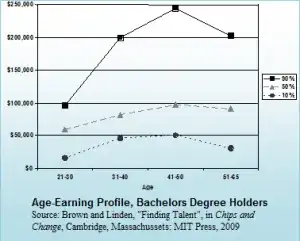Age is obviously a huge factor in
sports or a job that requires very
hard manual labor. What about in
software industry? Ageism does exist
(or does it not?), but why?
My guess would be ageism exists but can be hard to prove. Consider how a company may have a few different perspectives on future developers: Junior - Those just starting out that don't have a lot of experience but may still be idealistic enough to have a lot of drive, Intermediate - Those that have some experience and thus may be jaded by some of this experience though there is still some drive, Senior - Those that have survived a great deal, can mentor others and know what they are doing quite well. Based from those descriptions the Senior is likely to be the oldest while the Junior is likely to be the youngest though there are likely some exceptions I'm not sure how one could prove a statistical significance of the statistical difference.
Some straight questions:
Are corporations inherently evil and like to mistreat people just because?
Not all corporations are inherently evil though I imagine some likely are. Part of this also depends on how one wants to define evil and mistreat to some degree.
Are employers stupid / unorganized because they still liken software to construction industry?
I'd prefer to think of this as ignorance rather than requiring intelligence or organization skills. In some ways there are parallels to construction in the form of producing a product but it isn't exactly the same. Another side is that software development is still a relatively new field compared to construction or other areas that have been around for centuries.
Are older folks less productive?
In general I'd see this as more of a red herring. There is value in experience and having been in some situations that may repeat time and time again. However, in having that experience some people may get lazy so that there aren't big productivity gains.
Are they not willing to work crazy hours?
Some might though the bigger question is for what kind of bonus does the worker get for working crazy hours. If there is overtime paid properly then it may be much easier for some to swallow while others may see it as more of a gamble to work those crazy hours and hope the company will reward its employees appropriately.
Do they demand wages that are too high?
In some cases probably. I doubt that is true of all cases but then another side is aside from market forces what else is supposed to determine a "fair" wage?
Does it come down to hormones and
primal instincts? In monkey societies
testosterone is everything. What about
in code monkey societies?
I doubt it is all chemical and primal. There may be various reasons for things but I'm not sure how well an intangible like motivation can be studied to death. However, I would recommend checking out some Dan Pink stuff if you want more notes on motivation.
Is ageism a myth after all?
There are probably some legendary aspects to it that can make it become mythical in some ways. Course there are likely real stories of people not getting positions and believing age was a large factor which may or may not be true.
Do only the "lazy" ones (those who do not keep up) get lower salaries?
Lazy could be taken in a couple of forms. There is the not keeping up with technology but there is also those that will haggle and fight for a high salary. I don't like to fight and that could be seen as lazy since I'd rather spend my time doing other stuff than trying to squeeze every dollar out of a company in compensation.
Is it not about one's age but about having family and kids or not
having it, thus influencing how much
time on can spend keeping up with
stuff?
No, as I could imagine some people having strong commitments to charities that could be similar to a family and kids situation that shouldn't be forgotten here. At the same time, there may be some families where it is accepted that possibly both parents will work crazy hours to climb the corporate ladder.
Do employers want to pay young people more because they like the way
they look? Other?
Sometimes but usually there are other factors. An employer may see an opportunity for the young person to be more molded and trained to conform to a company's culture while older people may be seen as more stubborn.
Are my questions not very relevant? If so, then why?
I'd say they aren't bad for starting a discussion but I would question what kind of results are you expecting to get from this. Are you wanting something to hold up to say, "Hey, these people agree with me!" or something similar? Are you just wanting opinions and hypotheses to study? That would be how I'd question the relevance of asking these questions.
Even if I had a
lot of data, how do I prove strictly
the presence of ageism and the extent
of it?
My guess would be that there are various statistical analysis tools that could be used to mine the data to show the distribution of data agrees with some ideas within a margin of error, 19 times out of 20 probably.
Finally, what are some good ways for
an individual contributor to maintain
good salary level through older years?
Know thyself. What strengths do you bring to the table? What kind of work do you like to do? What skills are you keeping sharp that an employer will pay to see you use? Those would be the keys to my mind along with having some idea of how the world works.
